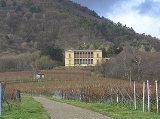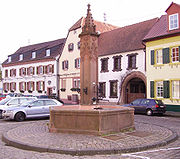
Edenkoben
Encyclopedia

Edenkoben is a municipality in the Südliche Weinstraße
Südliche Weinstraße
Südliche Weinstraße is a district in the south of Rhineland-Palatinate, Germany. Neighboring districts are Südwestpfalz, Bad Dürkheim, the district-free city Neustadt , Rhein-Pfalz-Kreis, Germersheim, and the French département Bas-Rhin...
district, in Rhineland-Palatinate
Rhineland-Palatinate
Rhineland-Palatinate is one of the 16 states of the Federal Republic of Germany. It has an area of and about four million inhabitants. The capital is Mainz. English speakers also commonly refer to the state by its German name, Rheinland-Pfalz ....
, Germany
Germany
Germany , officially the Federal Republic of Germany , is a federal parliamentary republic in Europe. The country consists of 16 states while the capital and largest city is Berlin. Germany covers an area of 357,021 km2 and has a largely temperate seasonal climate...
. It lies approximately halfway between Landau
Landau
Landau or Landau in der Pfalz is an autonomous city surrounded by the Südliche Weinstraße district of southern Rhineland-Palatinate, Germany. It is a university town , a long-standing cultural centre, and a market and shopping town, surrounded by vineyards and wine-growing villages of the...
and Neustadt an der Weinstraße
Neustadt an der Weinstraße
Neustadt an der Weinstraße is a town located in Rhineland-Palatinate, Germany. With 53,892 inhabitants as of 2002, it is the largest town called Neustadt.-Etymology:...
. Edenkoben is one of the towns situated along the German Wine Route. Edenkoben is the seat of the Verbandsgemeinde
Verbandsgemeinde
A Verbandsgemeinde is an administrative unit in the German Bundesländer of Rhineland-Palatinate and Saxony-Anhalt.-Rhineland-Palatinate:...
("collective municipality") Edenkoben
Edenkoben (Verbandsgemeinde)
Edenkoben is a Verbandsgemeinde in the Südliche Weinstraße district, in Rhineland-Palatinate, Germany. The seat of the municipality is in Edenkoben.- History :The Verbandsgemeinde was founded in 1972...
.
This part of the Rhineland passed to Bavaria
Bavaria
Bavaria, formally the Free State of Bavaria is a state of Germany, located in the southeast of Germany. With an area of , it is the largest state by area, forming almost 20% of the total land area of Germany...
at 1815 following the Congress of Vienna
Congress of Vienna
The Congress of Vienna was a conference of ambassadors of European states chaired by Klemens Wenzel von Metternich, and held in Vienna from September, 1814 to June, 1815. The objective of the Congress was to settle the many issues arising from the French Revolutionary Wars, the Napoleonic Wars,...
which reallocated many of the territories that had comprised Napoleon's empire
Mont-Tonnerre
Mont-Tonnerre is the name of a département of the First French Empire in present Germany. It is named after the highest point in the Rhenish Palatinate, the Donnersberg. It was the southernmost of four départements formed in 1798, when the west bank of the Rhine was annexed by France...
. Like several towns in the area, Edenkoben has both a Roman Catholic and a Protestant church (recalling King Maximillian's
Maximilian II of Bavaria
Maximilian II of Bavaria was king of Bavaria from 1848 until 1864. He was son of Ludwig I of Bavaria and Therese of Saxe-Hildburghausen.-Crown Prince:...
marriage to a Protestant princess
Marie of Prussia
Marie of Prussia was Queen of Bavaria and the mother of Kings Ludwig II and Otto of Bavaria.-Life:Born and raised in Berlin, she was the daughter of Prince Wilhelm of Prussia, a younger brother of King Friedrich Wilhelm III of Prussia, and his wife Landgravine Marie Anna of Hesse-Homburg...
).
Edenkoben's status as an administrative and cultural centre for the surrounding villages is reflected in the presence of several high-grade schools. The little town also has a considerable cultivation and trade in wine
Viticulture
Viticulture is the science, production and study of grapes which deals with the series of events that occur in the vineyard. When the grapes are used for winemaking, it is also known as viniculture...
. Outside the primary (agricultural) sector, industries include the manufacture of automotive exhaust systems
Exhaust system
An exhaust system is usually tubing used to guide reaction exhaust gases away from a controlled combustion inside an engine or stove. The entire system conveys burnt gases from the engine and includes one or more exhaust pipes...
and of doors. In former times there was a sulphur-spring
Mineral water
Mineral water is water containing minerals or other dissolved substances that alter its taste or give it therapeutic value, generally obtained from a naturally occurring mineral spring or source. Dissolved substances in the water may include various salts and sulfur compounds...
here called Kurbrunnen.
Edenkoben is overlooked, on its west side, by the imposing Friedensdenkmal, from the top of which visitors can enjoy a fine view across to the Rhine. Originally constructed to celebrate German unity in the aftermath of the Franco-Prussian War
Franco-Prussian War
The Franco-Prussian War or Franco-German War, often referred to in France as the 1870 War was a conflict between the Second French Empire and the Kingdom of Prussia. Prussia was aided by the North German Confederation, of which it was a member, and the South German states of Baden, Württemberg and...
, the memorial was renamed Friedensdenkmal (Peace Memorial) after 1945, when celebration of German military victories fell out of fashion in Europe: at the time of writing the Friedensdenkmal contains a small restaurant. The inscription on the Unification / Peace memorial reflects the determination of the German government in 1871 to downplay the extent to which the Treaty of Frankfurt
Treaty of Frankfurt (1871)
The Treaty of Frankfurt was a peace treaty signed in Frankfurt on 10 May 1871, at the end of the Franco-Prussian War.- Summary :The treaty did the following:...
resulted from military victory by Prussia
Prussia
Prussia was a German kingdom and historic state originating out of the Duchy of Prussia and the Margraviate of Brandenburg. For centuries, the House of Hohenzollern ruled Prussia, successfully expanding its size by way of an unusually well-organized and effective army. Prussia shaped the history...
. Given the frequency with which the German speaking Rhenish provinces had been devastated by French armies in the seventeenth and eighteenth centuries, it was in this region easy to emphasize the defensive nature of German unification.

